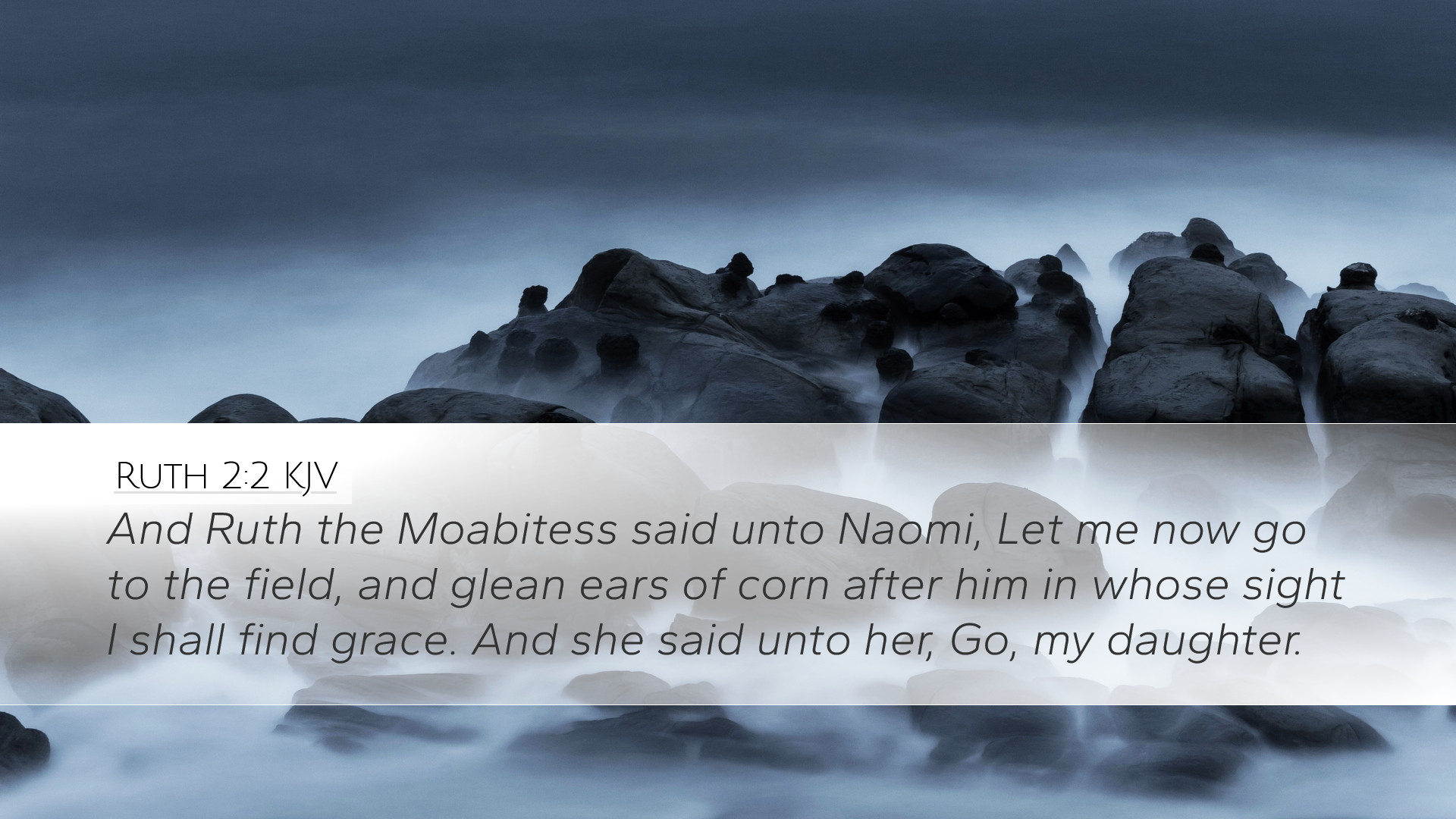Old Testament
Genesis Exodus Leviticus Numbers Deuteronomy Joshua Judges Ruth 1 Samuel 2 Samuel 1 Kings 2 Kings 1 Chronicles 2 Chronicles Ezra Nehemiah Esther Job Psalms Proverbs Ecclesiastes Song of Solomon Isaiah Jeremiah Lamentations Ezekiel Daniel Hosea Joel Amos Obadiah Jonah Micah Nahum Habakkuk Zephaniah Haggai Zechariah MalachiRuth 2:2
Ruth 2:2 KJV
And Ruth the Moabitess said unto Naomi, Let me now go to the field, and glean ears of corn after him in whose sight I shall find grace. And she said unto her, Go, my daughter.
Ruth 2:2 Bible Commentary
Commentary on Ruth 2:2
Verse: "And Ruth the Moabitess said to Naomi, 'Please let me go to the field, and glean heads of grain after him in whose sight I may find favor.' And she said to her, 'Go, my daughter.'
Introduction
The Book of Ruth presents a beautiful narrative of loyalty, kinship, and divine providence. In Ruth 2:2, a pivotal moment occurs that sets the stage for Ruth’s journey within the fields of Boaz. This commentary seeks to pull together insights from notable public domain sources to provide a holistic understanding of this significant verse.
Contextual Background
Ruth, a Moabite woman, had displayed unwavering loyalty to her Israelite mother-in-law, Naomi, after the death of their husbands. Their return to Bethlehem occurs against a backdrop of famine and distress, and Ruth’s desire to glean in the fields emphasizes her proactive character and dedication to survival and support for Naomi.
Insights from Matthew Henry
Matthew Henry emphasizes Ruth's courage and willingness to work. He notes that she seeks the grace of God by her actions, showcasing her desire to engage with the Jewish community and adhere to their customs. Henry points out that Ruth's request indicates a spirit of dependence not just on Naomi but ultimately on divine favor to sustain their needs. He highlights the stark contrast between Ruth’s servant heart and the cultural backdrop of Moabite society.
Reflections from Albert Barnes
Albert Barnes provides a deeper cultural analysis of gleaning laws outlined in Leviticus 19:9-10 and Deuteronomy 24:19. These passages made provision for the poor to glean leftovers, which Ruth is now keen on utilizing. Barnes notes the significance of Ruth's statement, "in whose sight I may find favor," reflecting her understanding of social structures and the favor of God, which she seeks through her actions. He underscores her humility and her acknowledgment of her position as a foreigner in Israel.
Comments from Adam Clarke
Adam Clarke explores the emotional and social implications of Ruth’s actions. He posits that Ruth's request is a step of faith, trusting that her efforts will be rewarded. Clarke also discusses the terminology used in describing Ruth as a “Moabitess,” pointing out the cultural prejudice she faced. However, Ruth's desire to glean represents not just a physical act of gathering food but an integration into the community and an expression of hope for divine acceptance.
Theological Implications
This verse raises several theological insights. Firstly, it illustrates the theme of divine provision and human effort — Ruth actively seeks to provide for Naomi while trusting in God's overarching care. Secondly, it shows the inclusivity of God’s grace, as Ruth, a Moabitess, steps into the covenant community of Israel. This narrative foreshadows the coming of Christ, who brings salvation to all nations, including the Gentiles.
Lessons for Modern Readers
- Faith in Action: Ruth exemplifies how faith translates into action. Modern believers are encouraged to seek God’s favor through works, loving their neighbors, and actively participating in the community.
- God's Providence: The verse encourages recognition of God’s hand in our journeys, particularly in times of scarcity and need.
- Breaking Down Barriers: Ruth's example challenges the church to be inclusive, welcoming those from all backgrounds and walks of life.
Conclusion
Ruth 2:2 serves as a remarkable testament to loyalty, industriousness, and faith. As pastors, students, theologians, and scholars study this text, they are reminded of the rich tapestry of God’s grace that weaves through human actions and divine providence. The commentary collectively highlights the strength of character displayed by Ruth and her pivotal role in God's redemptive plan for Israel and beyond.


